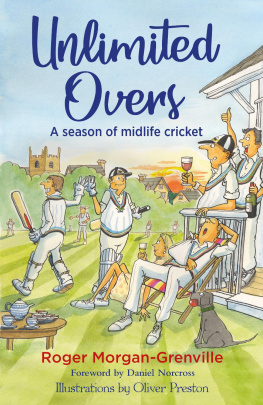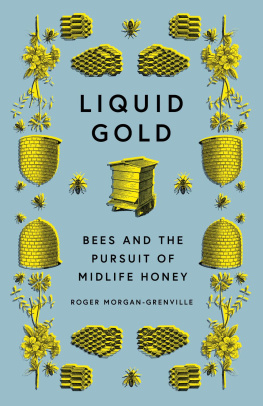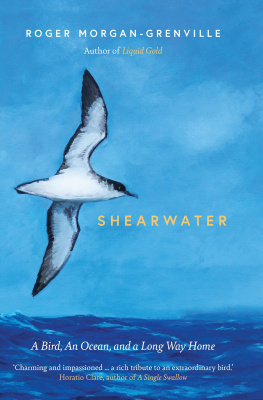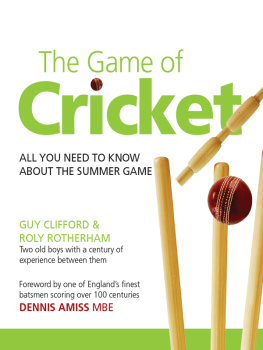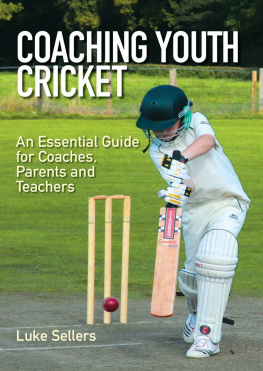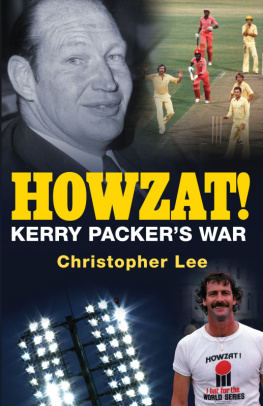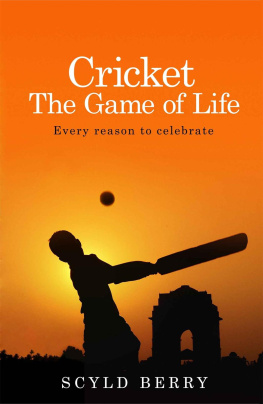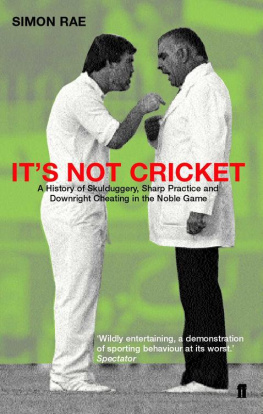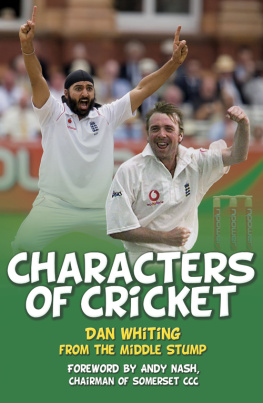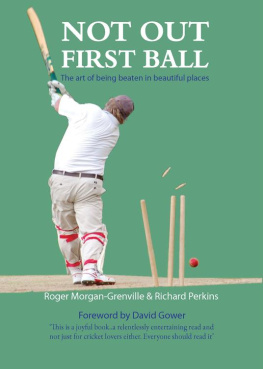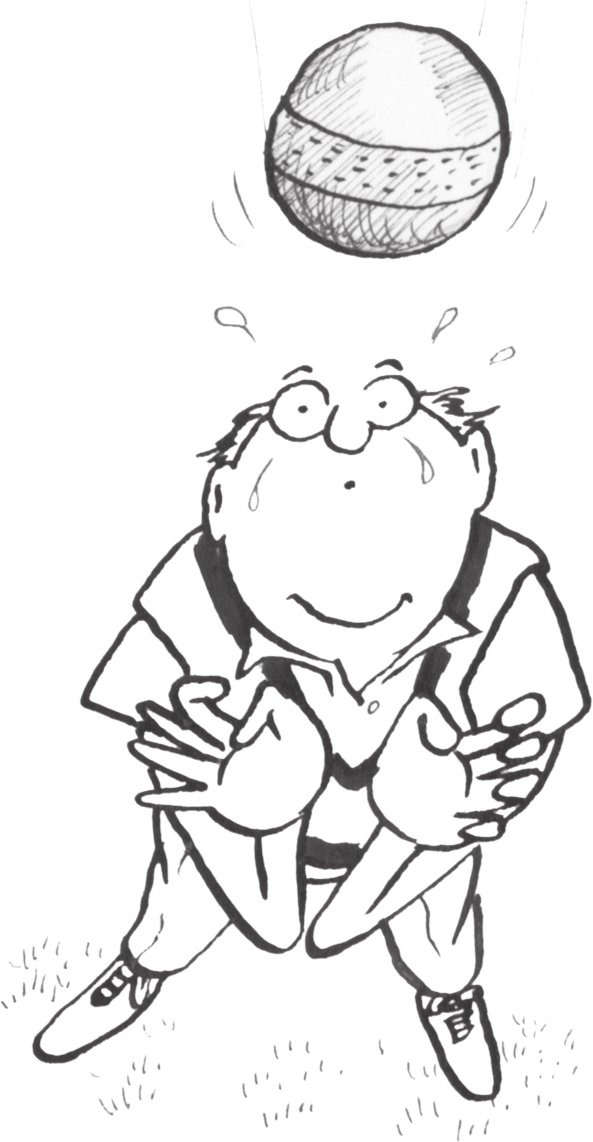Dedicated to the Tree Hugger, without whose strange telephone call back in July 1986, I would most likely never have played cricket again. And without whose early enthusiasm, the White Hunter Cricket Club would certainly never have happened.
H AROLD Pinter once said, I tend to think that cricket is the greatest thing that God ever created on earth certainly better than sex, a sentiment with which two of the heroes of this book (no spoilers) demonstrably agree. But its not the elite-level cricket that forms the staple diet of my day job as a radio commentator to which they refer. Its not marvelling at Ben Stokes cracking 258 at Cape Town, or purring as Virat Kohli creams effortless cover drives off 90-miles-per-hour Australian bowlers. Its not passive. Its active.
Broadcasters and writers tend to fixate exclusively on cricket in England through the prism of the professional game, in which around five hundred men and women ply their trade. Occasionally there is concern expressed about decreasing participation in the amateur game, but the solutions seldom involve existing cricket players and fans; instead we are told by administrators that initiatives must appeal to people who currently dont like cricket. People who think that rather than being better than sex, it might, at a pinch, be better than a poke in the eye with a sharp stick.
In a former life, I was captain of an amateur team for twenty years. It was the hardest and most rewarding thing Ive ever done. Maintaining equanimity in the face of a tornado of Friday night and Saturday morning cry-offs is the least of it. Among many other things, you must be an impresario, counsellor, caterer and event organiser. The least of your jobs is actually to be a cricketer.
This book is for all those admirable and patient souls who remain calm when their opening bowler tells them on Saturday morning that his hand is stuck in the car door and he wont be able to make it. For the captain who must sound delighted when his leading batsman tells him in February that his wife is expecting a baby in May, so he wont be around for the cricket season. For the captain who must mask his joy at the unexpected return of his star all-rounder, who has been missing for three years but is now back after the acrimonious breakdown of his marriage. But its also about the 750,000 dedicated amateurs that play the game and the millions more who used to play it, but simply cant anymore. The men and women who believe that this will be the week they score that hundred, or perfect that unplayable doosra. Its for people who, after a week of under-appreciation and endless demands from their (probably cricket-averse) bosses, whether in an office or factory, shop or building site, have the sanctuary of cricket where the only demands are the ones they place on themselves. Demands for a fifty, a couple of wickets, or the occasional spectacular catch. Demands that are almost always thwarted by their own and their teammates enduring shortcomings. But come what may, theyll get to blame the umpires for being sawn off just as they were getting their eye in, and take the piss out of the skipper for being too old and slow to saunter in the four yards required to take the bloody catch. They will stagger home with a hot, tanned face, a grazed knee from their sliding stop, and a comforting stiffness of the muscles that makes no sense, because they havent really done anything today. At the end of the season, theyve got a mountain of those memories. Theyve got that fifty. Theyve got that perfectly timed lofted thwack over mid-off for their only six. Theyve got an instinctive one-handed wonder catch. Theyve got the odd wicket as well. Theyve got the occasional victory. But most importantly, theyve got their friendships.
This book is for the people that make cricket both possible and the most magical game on earth, and yes, very possibly better than sex.
Dan Norcross
T HREE-QUARTERS of a million people play cricket in Britain in thousands of different clubs. This is a story of one of those clubs, in only one season.
Any sport club that survives more than a handful of years will have something more than the sport itself that binds it together, something else that defines it. It might be excellence, region, occupation, disability or even religion: once we had a match cancelled through the effects of Ramadan. Most often, though, it is simply plain friendship. It is the excuse for people to enjoy the company of others through the prism of a shared enthusiasm. We all think our club is special and the irony is, we are all right. When a club stops being special to its members, it quickly folds. So, by a process of logic, these are stories of friendships long before they are stories of cricket.
The White Hunter Cricket Club was born on 19 July 1986. We formed up because a team called the Rhinos had asked whether anyone in the Winchester area wanted a match, and two or three of us rather fancied the idea. We came together for just that one match and called ourselves the White Hunters, because we had the childish notion that the name would irritate a team called the Rhinos, which it didnt; they thought it was rather charming. We went on to lose, and only four of us turned out again when the match was reprised the following year.
We lost again, but something about it all appealed to a small group of us, and we set up six fixtures for the following year, then eight, then ten, and so on. After that it was a logo, and the club sweaters and caps that inevitably followed. We ventured out of Hampshire and in 1990, did our first overseas tour. It was a long weekend in Yorkshire and, in those pre-internet days, we were unable to discover before it was too late that our Sunday opposition were actually second in the Tetleys Yorkshire League and had members who could bowl at eighty miles per hour. Rain helped us to scrape a draw, and we felt invincible.
France followed a while later, where our notion that we were going to meet incompetent players called Guillaume, with bunches of onions strung across their bike frames, evaporated in the cruelty of an utter drubbing at the hands of expat Australian and Caribbean cricketers, on a field by the bend in the Loire River at Saumur.
Over the next thirty-three seasons, we have played exactly 100 oppositions, on eighty-five grounds, in 386 separate games, and with the services of 342 players. We have won 135 of those games, lost 189, drawn 53, tied seven, and death has stopped one. And yes, we are aware that the maths doesnt work. Somewhere out there is a match that none of us have the faintest recollection of being involved in, and yet we know that we played it.
During those years we grew from being young men, possibly with girlfriends, to being married, and then having young children, then getting those teenage children to play. My oldest son is now only three years younger than I was when we set up the club. Cricket has an odd habit of being dynastic, so this story is about time as well, time as measured equally in drop scones and dropped catches, and time as a commodity that goes only one way. As much as anything, the story of the club is also the story of defiance: of age, injury and, often enough, common sense.

